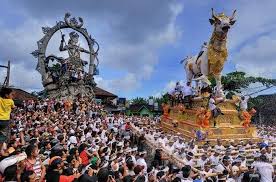KUPASONLINE.COM — The enchantment of the natural beauty of the island of Bali does not need to be doubted anymore. Throughout the island we can enjoy the natural beauty that stretches, from mountains, beaches and even lakes. However, there are unique things that make Bali even more special, namely the preservation of culture which is deeply felt in the joints of people’s lives. Visiting Bali feels more special if we manage to get exciting moments by watching traditional ceremonies in Bali. Generally, these traditional ceremonies can be witnessed by tourists to simply witness or document them.
Here are seven traditional ceremonies on the island of Bali which have their own uniqueness:
1. Ngaben Ceremony
The Ngaben ceremony is a cremation ceremony in Bali which is believed by the Balinese Hindu community as a ritual to perfect the body back to the Creator. Ngaben ceremonies are divided into three types, namely: Ngaben sawa Wedana, Ngaben Asti Wedana, and Private. The Ngaben Sawa Wedana ceremony is carried out after the corpse has been preserved before the burning ritual takes place. Meanwhile, Ngaben Asti Wedana is carried out after the body is buried first. Finally, a private ceremony is performed for Balinese residents who died outside the area or whose bodies were not found.
Given the large amount of money that will be incurred for the Ngaben ceremony, not all Balinese people can carry out this ceremony for families who have died. However, both the traditional village government and the provincial government held a mass cremation ceremony intended for underprivileged families so that the bodies of their ancestors could be purified or cleaned in accordance with Hindu religious teachings. So, the Ngaben Ceremony will not always be carried out and cannot be predicted.
2. Melasti Ceremony
The Melasti ceremony is a purification ceremony for both oneself and sacred objects belonging to the temple. In Hindu religious beliefs, water sources such as lakes, seas and springs are the source of life or tirta amerta. In this event, people flock to the sea or water sources dressed in white and carrying prayer equipment and usually carrying pratima, sacred objects or statues to be cleaned in a sekala and niskala manner.
The purpose of this ceremony is to increase devotion to the Gods and manifestations of God and to increase Hindu awareness to restore environmental sustainability. If you want to witness this traditional ceremony, come 3 or 4 days before the Nyepi celebration is held and stay at hotels close to large Hindu temples such as in Kuta or Uluwatu.
3. Saraswati Day
Saraswati Day is a holiday to celebrate knowledge. On this holiday, Balinese Hindus usually perform a special ceremony to worship or glorify Dewi Saraswati who is believed to have brought knowledge on earth to make everyone in the world smart and educated. Everything related to science such as books and scriptures is prayed for in the Saraswati ceremony. Not only that, there are usually dance performances and story readings that last all night
4. Galungan Day
Galungan comes from Old Javanese and means ‘Winning’. As the name implies, this traditional ceremony in Bali aims to celebrate victory over evil. In addition, the Galungan ceremony is also held to commemorate the creation of the universe and its contents. The series of Galungan holidays has been going on for about 25 days before Galungan. Every 210 days of Balinese calendar, Hindus in Bali celebrate Galungan Day.
5. Mepandes Ceremony
Also known as Metatah or Mesuguh, the traditional Mepandes ceremony is performed when a child enters adolescence. In this Mepandes Ceremony, the 6 upper canine teeth of children who are growing up will be scraped off. This tooth-cutting ceremony is held with the aim of getting rid of bad desires such as greed, jealousy, anger, and so on.
6. Ngerupuk Ceremony
The Ngerupuk ceremony is carried out exactly the day before Nyepi day and the community is required to make offerings to Bhuta Kala, with the aim of expelling Bhuta Kala so that it does not interfere with human life while doing Brata Penyepian. The ritual starts with torching the house, spraying the house and yard with gunpowder, and hitting objects to make a noise. After this traditional ritual in Bali is finished, there will usually be an ogoh-ogoh parade which is paraded with torches around the residents’ living areas.
7. Tumpek Landep Ceremony
Tumpek Landep is a ceremony performed by the Balinese people to purify their weapons and equipment, with offerings and prayers. This ceremony will be led by traditional leaders, and carried out in a temple which is considered sacred and has the right location. All weapons and equipment belonging to the community which are consecrated are respected can provide blessings for the owners of these weapons and equipment.
In connection with the unfinished condition of the COVID-19 pandemic, in September 2020 the Provincial Government of Bali together with Parisada Hindu Dharma Indonesia (PHDI) and the Bali Province Traditional Village Council (MDA) issued a circular letter relating to the application of health protocols when carrying out traditional and cultural ritual activities the. The circular letter essentially limits traditional and cultural activities that cause crowds. In its implementation, Pecalang as the customary security unit together with traditional village leaders is at the forefront in controlling the implementation of the health protocol. Residents’ compliance with customary rules and traditional leaders is key in anticipating current conditions.(*)







